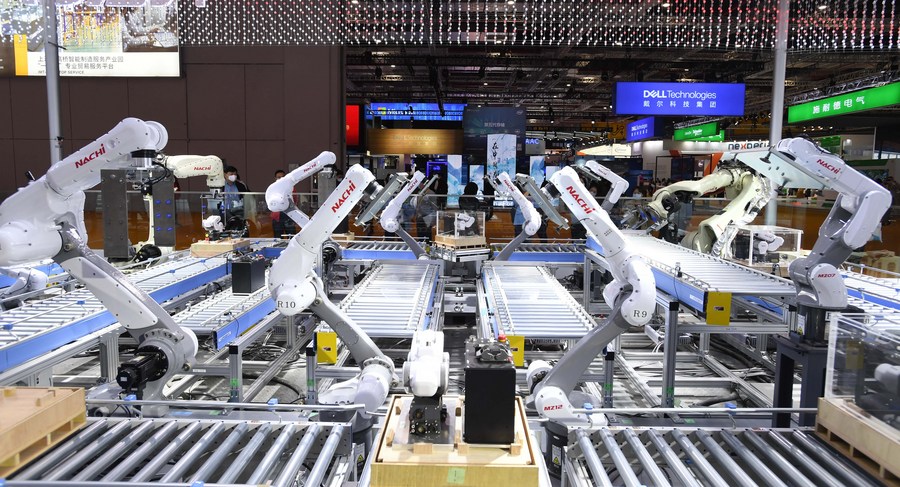"Two sessions" reaffirm China's commitment to wider, win-win opening-up

Aerial panoramic photo taken on Sept. 12, 2020 shows the Houhai area in Nanshan District of Shenzhen, south China's Guangdong Province. [Xinhua/Mao Siqian]
BEIJING -- When the COVID-19 pandemic drained global economic confidence last year, China's dynamic market brought a sense of certainty.
Now at the ongoing annual "two sessions" where lawmakers and political advisors nationwide pool their wisdom into China's modernization drive, China reaffirms its decades-long commitment to opening-up.
China is ready to open more broadly and confident in its ability to do so, building on its strong recovery momentum. Last year, the country pulled ahead of the major economies to achieve positive growth, with its gross domestic product (GDP) rising 2.3 percent year on year.

Photo taken on Nov. 5, 2020 shows the industrial robots of Nachi company from Japan at the Intelligent Industry and Information Technology exhibition area during the 3rd China International Import Expo (CIIE) in Shanghai, east China. [Xinhua/Li Renzi]
Anticipating bullish growth in 2021, the country has set its annual GDP target at over 6 percent, boosting morale while leaving room for policy maneuver. Market expectations and forecasts by major international organizations point to higher growth. The Organization for Economic Cooperation and Development projected that China's GDP will rise 7.8 percent this year. No doubt, the China locomotive will continue to inject impetus to the pandemic-hit global economy.
China's integration into the world showed that there is no reason for the country to shut its doors. It is crystal clear that openness leads to prosperity, while closed doors invite obscurity.
This year marks the 20th anniversary of China's accession to the World Trade Organization. China has continuously contributed to the process of globalization and achieved win-win results alongside the rest of the world. Over the past two decades, the country's average annual contribution to world economic growth has neared 30 percent, while its overall tariff level has dropped from 15.3 percent to below 7.5 percent.
At this historic development juncture and the starting point of the 14th Five-Year Plan (2021-2025), China's economy has embarked on a new journey with three major driving forces: scientific and technological innovation, the expansion of domestic demand, and reform and opening-up, which will help further unleash the vitality of the country's huge market.

Delegates from China and Switzerland sign an agreement at the booth of STOR-H TECHNOLOGIES SA from Switzerland during the third China International Import Expo (CIIE) in Shanghai, east China, Nov. 6, 2020. [Xinhua/Fang Zhe]
China will promote the liberalization and facilitation of trade and investment, and steadily promote the opening-up of financial sectors including banking, securities, insurance and futures, according to the draft outline of the new five-year plan.
In addition to opportunities, opening-up also brings new challenges. How can the world's second-largest economy continue to flourish amid intensified global competition?
"Facing new problems and challenges brought by globalization, we should not retreat into protectionism, isolation or decoupling, but work together to make globalization more open, inclusive, balanced and beneficial for all," State Councilor and Foreign Minister Wang Yi said during this year's "two sessions."
The views don't necessarily reflect those of Qiushi Journal.
























